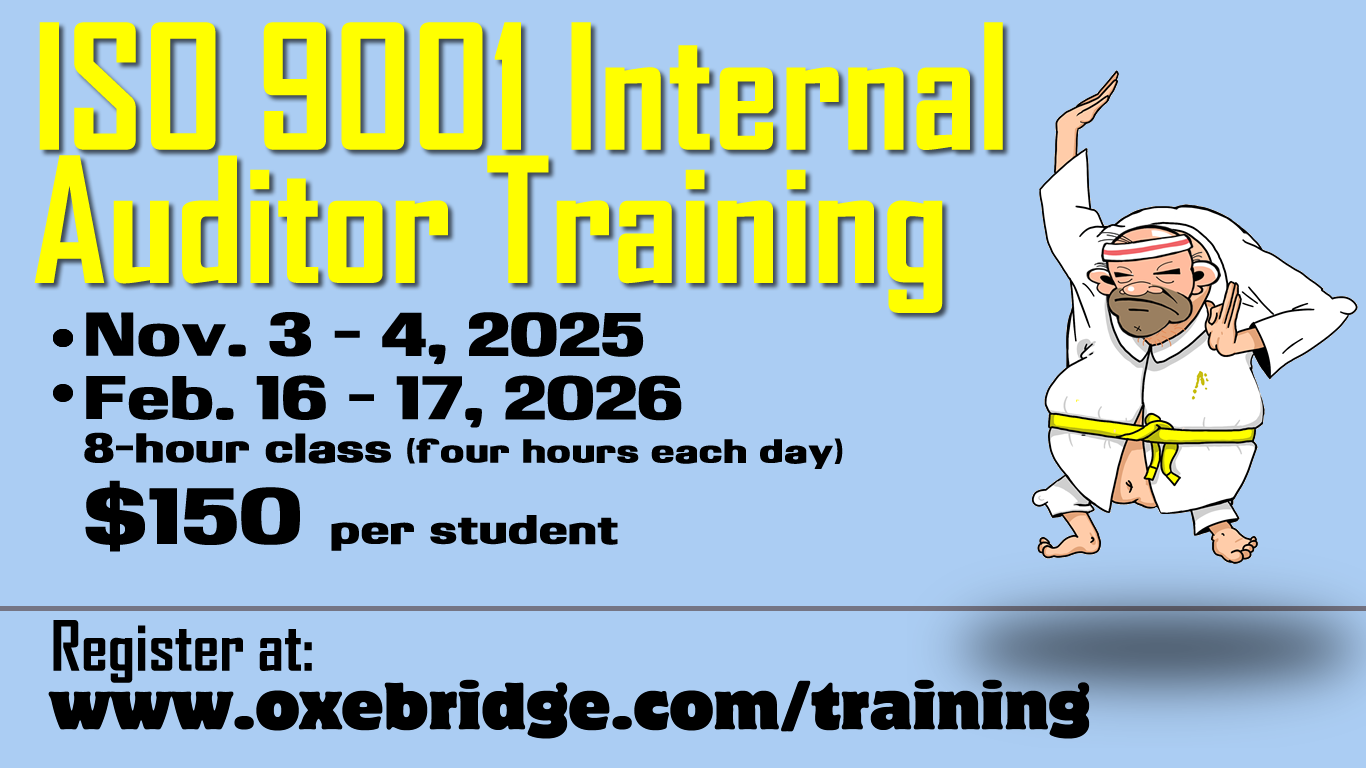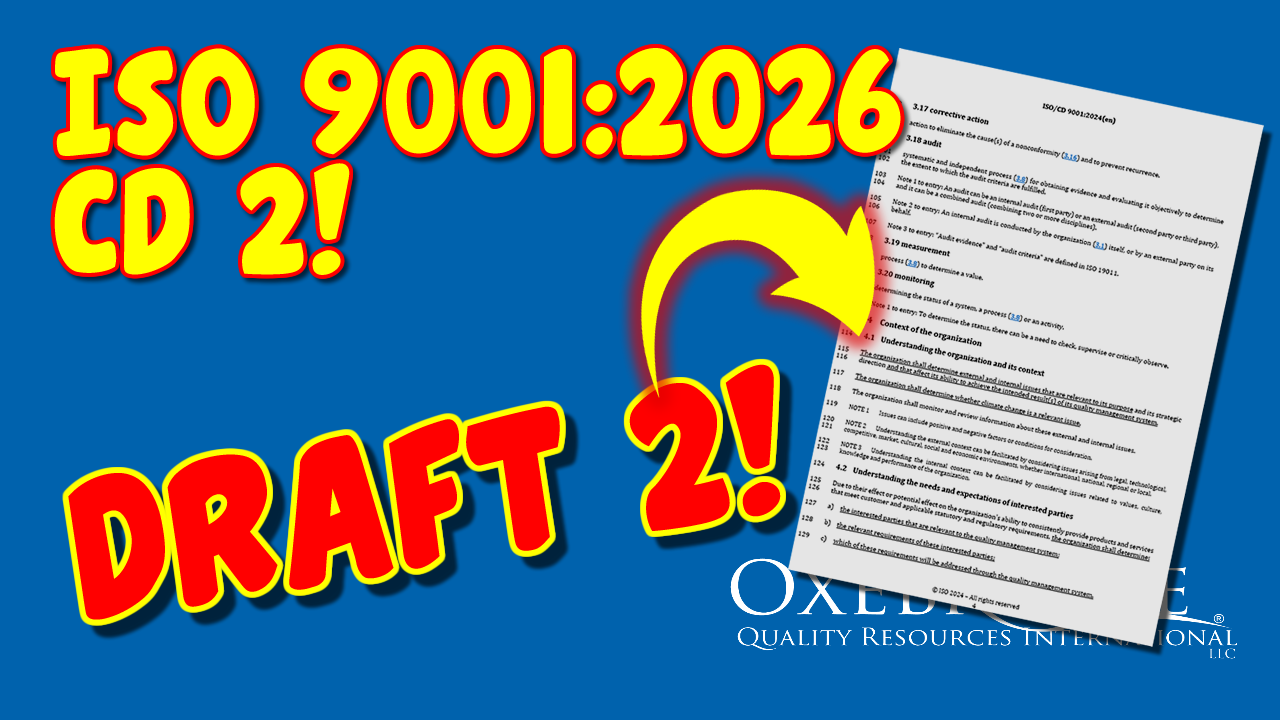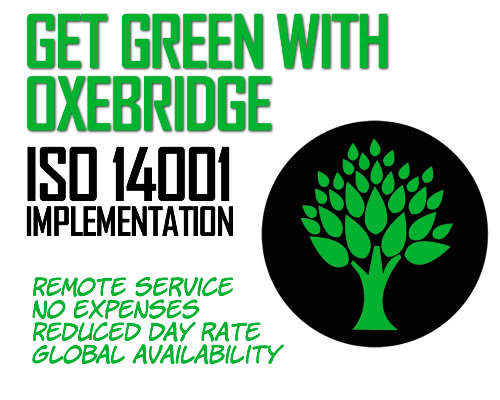Tampa FL — Representatives of ISO 9001 oversight organizations from around the world have responded favorably to a previous warning issued by Oxebridge that CMMI would overtake ISO 9001 in importance if dramatic steps are not taken to improve the aging QMS standard. Subsequently. Oxebridge received numerous favorable replies from organizations such as ANAB, ISO’s TC 176 and even ISO itself, while the United States TAG to TC 176 has failed to provide any response at all.
This complicates matters for Oxebridge’s push to improve ISO 9001lest if fall behind the monopoly-controlled CMMI standards, which stands to increase costs to QMS certification seekers tenfold or more. Any proposals for changes to the ISO 9001 standard cannot be made directly to ISO or its Technical Committee 176, but through the nation’s official TC 176 representative body. In the US, that body is the Technical Advisory Group to TC 176, chaired by Alka Jarvis. Ms. Jarvis was sent a copy of the Oxebridge article in March of 2010, as were other members of the group, but nine months later, no one from the US TAG has replied in any way.
Charles Corrie, chair of ISO’s Technical Committee 176, wrote to Oxebridge within only days of receiving the article.
Thank you for your very interesting paper. We are at an initial stage in looking at how to shape the future for ISO 9001 (and related standards), so your article is certainly timely.
While we are always very pleased to receive support for our activities; however, and regrettably, I have to advise that I am unable to take it further within ISO/TC 176/SC2 at this time, unless it is supported by one of ISO’s member national standards bodies, or by a recognized liaison organization.
I note you are based in the USA, and that you have copied the chair of the ANSI TAG to ISO/TC176 on the e-mail. As such, I will await the results of their consideration of it, and hope that they will be willing to give it the necessary support.
Similar supportive comments were received from representatives of ANAB, ISO, ASQ and other important ISO 9001 oversight organizations, but not a single member of the United States representative body — including Alka Jarvis herself — have seen fit to reply.
Oxebridge warns that CMMI — which is operated entirely by Carnegie Mellon University’s Software Engineering Institute (SEI) — operates as a monopoly-controlled standard which can run ten times the costs of ISO 9001 in implementation and auditing, with a baseline CMMI Level 2 implementation for a small company with only a single project costing well over $100,000. As a comparison, a typical Oxebridge fee for ISO 9001 of such a company would fall at, or under, $20,000. Furthermore, CMMI cannot be done in a “rapid” fashion, and even a small implementation can take a year or more, while Oxebridge routinely delivers ISO 9001 in only 2 – 3 months.
CMMI has branched out into providing standards not only for software developers, its original target audience, but now for service providers and manufacturers as well. Already. Oxebridge has found that some companies are left with the impression that ISO 9001 has “faded in importance” only to be supplanted by CMMI, which has a more aggressive marketing engine behind it, fueled by SEI’s monopolistic funding.
“Once again, the US TAG has failed to abide by its mandate to support ISO 9001 and to prevent the proliferation of competing standards,” says Christopher Paris, Oxebridge founder and VP OPerations. “In the past, they sat idly buy and watched, and later supported, the work by various sectors to develop variants of ISO 9001, instead of working to improve ISO 9001 so that id could truly be universal.” Paris is referring to sector-specific standards such as AS9100 for aerospace, TS 16949 for automotive, and TL 9000 for telecommunications.
Paris offers a personal interpretation of the problem. “Many of the members of the US TAG were, or are, consultants for these various standards, so they have personal interests in ensuring that their portfolios include more than just ISO 9001.”
Paris points to work done by the US TAG which supported the automotive industry’s efforts to create its own special process certification program, rather than align itself with the already-established, and robust, NADCAP accreditation program in place for aerospace. At one TAG meeting Mr. Paris questioned the group about why it was tolerating redundant standards, giving an example of a real Oxebridge client which, as a 8-man machine shop servicing both aerospace and automotive industries, would have to implement as many six or seven QMS standards in order to comply with customer requirements. “The intent of ISO 9001 and the US TAG should not be to put companies out of business,” Mr Paris claimed at that meeting. Regardless, no effort was made by the US TAG to curb such activities.
“When ISO 9001 dies within the US, and the Chinese – who are embracing it at an incredible pace – replaces the US as a world leader in quality, some fingers will be pointed directly at the leadership if the US TAG,” Paris warns. “They have the power to reverse this, but apparently they lack the will.”
Christopher Paris is the founder and VP Operations of Oxebridge. He has over 35 years’ experience implementing ISO 9001 and AS9100 systems, and helps establish certification and accreditation bodies with the ISO 17000 series. He is a vocal advocate for the development and use of standards from the point of view of actual users. He is the writer and artist of THE AUDITOR comic strip, and is currently writing the DR. CUBA pulp novel series. Visit www.drcuba.world







